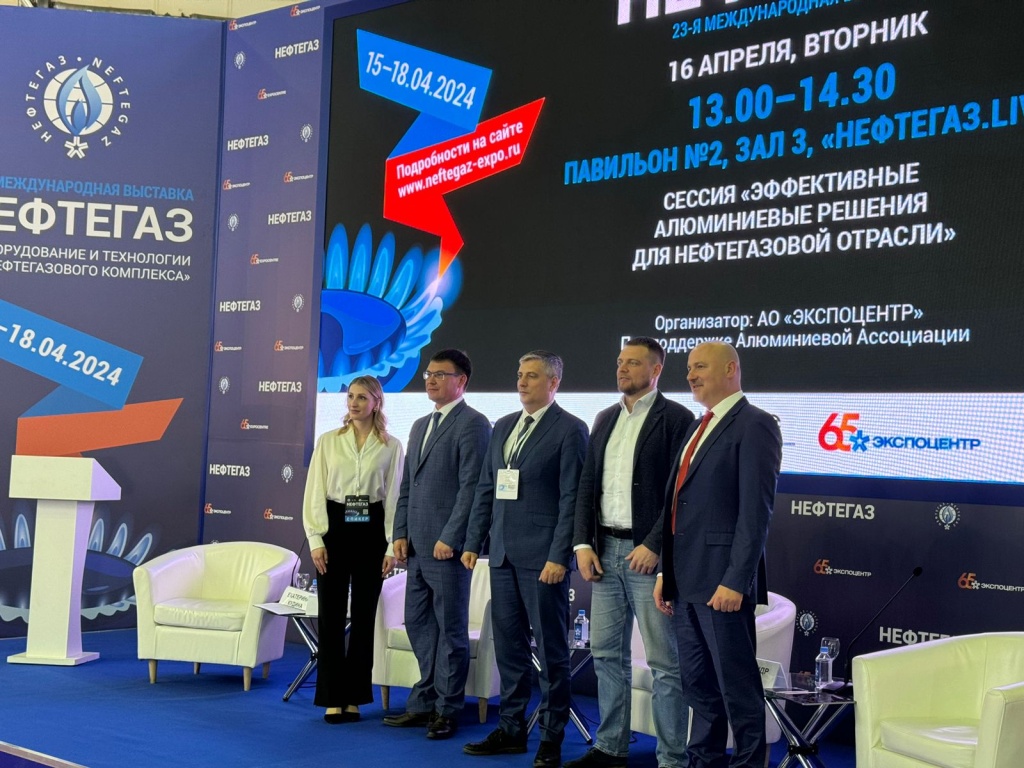19.04.2024 - Aluminium Association
As part of the business agenda of the 'Neftegaz 2024' 23rd international exhibition, a themed session called 'Effective aluminium solutions for the oil and gas industry' was held. This session was organised by the Aluminium Association. This year's session was attended by representatives from the Moskabel Plant, VNIPIneft OJSC, Bogoslovsky Cable Plant (BKZ), and the Aluminium Association. The experts discussed how to reduce project costs, to substitute imports, and to make cable products more reliable for the oil and gas industry. They also talked about the technical and economic benefits of using aluminium alloy cables at petrochemical and oil refining plants. Finally, they explored innovative alloys and cable solutions for the oil and gas sector.
Alexander Gusev, Director General of RusCable Media Holding, moderated the event.
The session was opened by Mikhail Rudyk, an expert in the Energy sector of the Aluminium Association. He spoke about the types of aluminium alloys used in electrical engineering. Aluminium and copper are the main materials used in electrical engineering. However, aluminium sees many times wider use than copper as a conductive core in cable products. In recent years, copper has been getting more expensive, so aluminium is becoming a more and more obvious choice. Judging by the physical and chemical properties of the two metals, an aluminium conductor with the same electrical conductivity will cost at least five times less than its copper counterpart.
Cost savings are the main factor contributing to the expanding use of cable and wire products.
With the development of new electrotechnical aluminium alloys, issues such as brittleness and low-temperature creep have been overcome. Advantages of 8xxx-series aluminium alloys: high mechanical properties and low-temperature creep resistance; high fatigue life capability, as well as corrosion resistance
Aluminium-zirconium alloy is used in cable products where increased strength, corrosion resistance, and high electrical conductivity are required. Such alloys are known for their exceptional thermal stability (up to 300 °C). They also possess remarkable mechanical properties, long fatigue life capability, good low-temperature creep resistance, and excellent corrosion resistance.
Russian cable companies have created a wide range of cables and wires made of aluminium alloys. These include power cables for fixed installation rated for up to 3 kilovolts, widely used in the construction of residential buildings and structures, and cables for non-stationary installation up to 6 kilovolts that meet the Class 5 flexibility requirements per GOST 24334-2020. They are resistant to kinks and are more reliable and durable than many other conductors. Using cables and wires made of 8xxx-series alloys can help save up to 60% compared to copper cables.
High-temperature non-insulated wires for overhead power lines can increase the capacity of these lines by up to two times. They also reduce erecting sag and allow for longer distances between supports, leading to a significant reduction in the cost of constructing and reconstructing power lines. The cost of oil-resistant cables for submersible electric pump installations can be up to 40% lower compared to copper cables. Additionally, the weight is reduced by 30%, and the service life is extended.
Alexey Lobanov, the head of the sales department at the Bogoslovsky Cable Factory (BKZ LLC), talked about how to reduce the cost of electricity supply without compromising on quality. According to Alexey Lobanov, the plant produces the following products with conductive cores made of aluminium and aluminium alloys: flexible cable; oil-resistant cable; power cable; aerial bundled cable; non-insulated aluminium cable; semi-finished products such as wires and strands.

ELKAOIL and ELKAOIL ECO oil-resistant cable versions have been created for the oil and gas industry.
Total cost reduction for the purchase of aluminium cable: ELKAOIL ECO – 648,000 roubles/km, VAT excl.; ELKAOIL – 317,000 roubles/km, VAT excl.
They are highly resistant to hydrogen sulfide, dissolved in the oil well fluid. The issue of copper ions affecting the polymer insulation is absent. Energy consumption is reduced by over 10%, and the product has a low carbon footprint. The largest Russian oil companies procure and use the cables with success.
Dmitry Chudnykh, Project Sales Director of the Moskabel Plant, presented a report on the company's cable products for oil and gas facilities. He talked about special-purpose cables that help solve problems such as high costs of foreign equipment, difficulties in finding information about existing cable lines, the need for cables that can be used in extreme cold temperatures, and the risk of cable cover embrittlement. The company has developed its own innovative cable under the CRYOSIL brand. This cable can withstand extreme low temperatures up to minus 80°C during operation and up to minus 45°C during installation. Thanks to the materials used, it is not prone to cover embrittlement. It provides an alternative to imported products in the cable industry. The KGBE cable is intended for use in drilling equipment. It is the first Russian-made cable that has passed the tests as part of the upper drive system in a drilling rig. To address the issue of a shortage of imported components for cross-linked polyethylene insulation, Moskabel Plant has developed the TEVOX cable with heat-stabilised insulation. The metal casing, made of 8xxx-series aluminium alloy, provides complete protection for the cable's insulation from water ingress and also protects it from mechanical damage during installation and use. TEVOX is used in a wide range of projects by the largest electric grid companies. In 2020, the plant started producing power cables armoured with seamless corrugated aluminium tubes. This type of armoured cable is suitable for laying in permafrost regions, on rocky and swampy terrain, under water, and across rivers.

The high volatility of the market for non-ferrous metals, especially copper, has led to an increase in the cost of projects. The use of aluminium cables can save up to 30% of the project cost.
Ekaterina Kudina, an engineer at VNIPIneft OJSC, presented a report on the technical and economic benefits of using cables made of aluminium alloy in petrochemical and oil refining plants. Cable products are a crucial part of electrical equipment, and the cost of these products compared to the cost of installation is approximately 10–15%. In this context, using cables with an aluminium alloy core helps reduce this indicator, making projects more cost-effective. The advantages of cables made of aluminium alloy are: lower purchase costs; lighter weight; resistance to repeated kinks; high performance; carbon footprint reduced by up to 50%.
According to Ekaterina Kudina, VNIPIneft designs about 4-5 facilities per year located outside explosion and fire hazard zones. These facilities can use cables with cores made of aluminium alloy, which can save up to 50% on the cost of cable products.
Based on the analysis of cable products and the calculations performed, it has been confirmed that using cables with cores made of aluminium alloy at oil refineries and petrochemical plants is highly cost-effective. A cable with aluminium alloy cores is more affordable than a copper cable and has similar technical characteristics.


